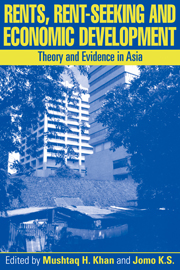Book contents
- Frontmatter
- Contents
- List of Figures
- List of Tables
- List of Contributors
- Acknowledgements
- List of Abbreviations
- Introduction
- 1 Rents, Efficiency and Growth
- 2 Rent-seeking as Process
- 3 Rent-seeking and Economic Development in Thailand
- 4 Thailand's Old Bureaucratic Polity and Its New Semi-democracy
- 5 Obstructive Corruption: The Politics of Privilege in the Philippines
- 6 Funny Money: Fiscal Policy, Rent-seeking and Economic Performance in Indonesia
- 7 The Malaysian Development Dilemma
- 8 Financial Sector Rents in Malaysia
- Index
3 - Rent-seeking and Economic Development in Thailand
Published online by Cambridge University Press: 05 March 2012
- Frontmatter
- Contents
- List of Figures
- List of Tables
- List of Contributors
- Acknowledgements
- List of Abbreviations
- Introduction
- 1 Rents, Efficiency and Growth
- 2 Rent-seeking as Process
- 3 Rent-seeking and Economic Development in Thailand
- 4 Thailand's Old Bureaucratic Polity and Its New Semi-democracy
- 5 Obstructive Corruption: The Politics of Privilege in the Philippines
- 6 Funny Money: Fiscal Policy, Rent-seeking and Economic Performance in Indonesia
- 7 The Malaysian Development Dilemma
- 8 Financial Sector Rents in Malaysia
- Index
Summary
The Asian economic crisis of the late 1990s has intensified debates over the consequences of corruption and rent-seeking for economic growth. The events that began in Thailand in 1997 and spread rapidly to the rest of the region have allowed critics to say, ‘We told you so’. These critics were able to draw upon a substantial body of economic theory linking corruption and rent-seeking with poor economic performance. Neo-classical economic theorists have long assumed that ‘clientelism and the rent-seeking behaviour associated with it are fundamentally inimical to national economic growth’ (Maclntyre 1995: 4). Practitioners of the public choice school of economics have devoted considerable attention to the undesirable consequences of rent-seeking. Gordon Tullock, one of the pioneers of the public choice school of economics, went so far as to suggest that rent-seeking ‘is one of the basic reasons for Asia's backwardness. Asian countries have been doing this for a very long time’ (Tullock 1980: 25). State-centred explanations of economic growth also assume that clientelism and rent-seeking are harmful to growth. Much of the literature on the role of the state in promoting rapid growth in the East Asian newly industrializing countries stresses the importance of insulating state officials from rent-seeking.
There are two major problems with explaining Thailand's problems by focussing mainly on clientelism, corruption and rent-seeking. The first is that it experienced several decades of sustained, rapid economic growth prior to 1997. If clientelism, corruption and rent-seeking are so damaging, how did Thailand grow so fast for so long?
- Type
- Chapter
- Information
- Rents, Rent-Seeking and Economic DevelopmentTheory and Evidence in Asia, pp. 145 - 181Publisher: Cambridge University PressPrint publication year: 2000
- 23
- Cited by



